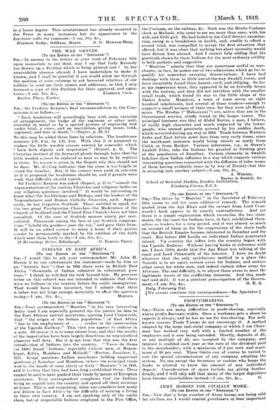ITo ran EDITOR or THE " SPECTATOR.") FIR, —Your correspondent
" Maevitte ". in his eery interesting letter (and Ism especially grateful ter the justice he does to the East African native) maintains, quoting Lord Cranworth, that " the origin of the Indian population" of East Africa " lies iu the employment of . . . coolies in the construction of the Uganda Railway." This view you appear to endorse in a note. Of course it is to some extent true, and that the results of the importation have been largely disastrous no unprejudiced abeerver will deny. But it is not true that this was the first introduction of Indians into the country. " Vasco da Gama Liu 1498) found Indians,' especially Calieut men, at Mozam- bique, Kilwa, Mombasa and Malindi " (Burton, Zanzibar, I., 327). Krapf mentions Indian merchants holding important positions at Zanzibar and Mombasa (where the principal trade woe in the kinds of some thirty or forty " Bettye. ") in 1844, and it is clear that they had been long established there. These cannot be said to have pushed their trade by means of European assistance. Your correspondent complains that the Indians bring no capital into the country and spend all their earnings at home. This is not surprising, when one considers how many are driven to East Africa by the difficulty of earning a living in their own country. I am not speaking only of the coolie class, but of respectable Indians employed in the Post Office,
the Customs, on the railway, fie. Such was the Hindu Customs clerk at Malindi, who came to see me more than once, with hie wife and little girl. He bad failed in his Civil Service examina- tion, owing to a breakdown in health, and, unable to afford a second trial, was compelled to accept the first situation that offered, but it was clear that nothing but sheer necessity would have driven him abroad. And I cannot help adding that the gratitude shown by these Indians for the most ordinary civility is both pathetic and suggestive.
" Heavies" admit. that they are sometimes useful as mer- chants; in fact, he makes one or two admissions which go far to qualify his somewhat sweeping denunciations. I have had dealings with them in little out-of-the-way Swahili towns, and have invariably found then[ honest, civil, and obliging. So far as my experience went, they appeared to be on friendly terms with the nativee, and they did not interfere with the smaller retail trade, which found its way to the little shops of the Shehri Arabs. Mambrui, a town of some seven or eight hundred inhabitants, had several of these traders—enough to support a small mosque of their own, for they were all kfusal- mans. The Hindus ("Efabanyani") ore, unless they are in the Government service, chiefly found in the larger towns. The principal business was that of Abdul Kerim, a man, I believe, of really high character and much respected by the towns- people, who seemed genuinely grieved by his sudden death, which occurred during my stay in 1913. Trade between Western India and East Africa most date from very early times, since the north-east monsoon would bring vessels as easily from Catch as from Muskat. Various references, e.g., in Steere's Swahili Tales, take the Indiana for granted as forming part of the population of Zanzibar. Certain elements in Swahili folk-lore show Indian influence in a way which suggests various interesting questions connected with the diffusion of tales (some of them having eridently come in by way of Persia)—but this is straying into another subject—I am, Sir, fie.,
A. Wzatase, Reader in Swahili, Ac. School of Oriental Studies, London Institution, Finsbury Circus, E.C. 2.


































 Previous page
Previous page